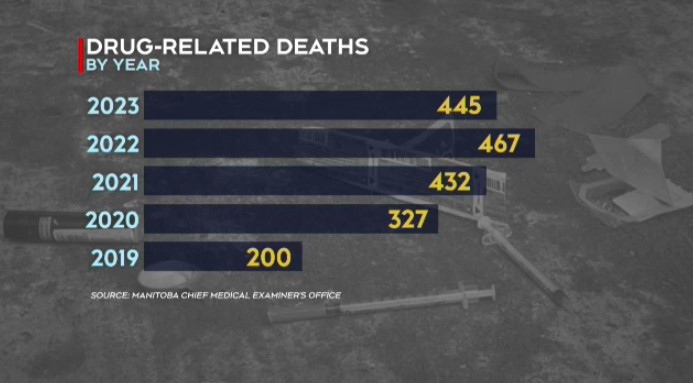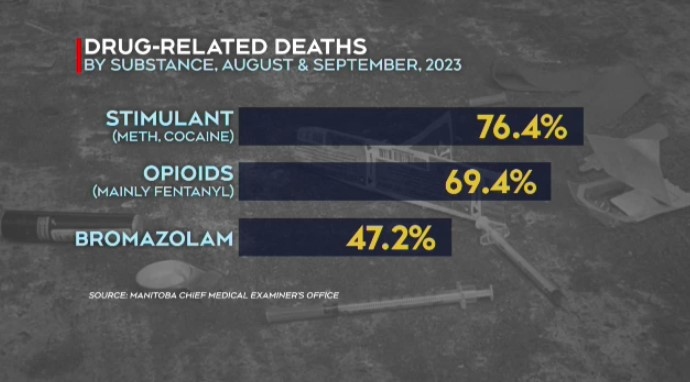Surging drug deaths show Manitoba is ‘fighting a war with a water pistol’: advocates
Advocates say the province is trying to fight a war with a water pistol, as new data shows drug-related deaths in Manitoba are surging.
The drug crisis in Manitoba has hit close to home for Marion Willis and the team at St. Boniface Street Links. She said one of their outreach workers died of a drug overdose last weekend.
“I wish I could say that these deaths become easier to accept, but I’d be lying to you,” she told CTV News. “You know, it doesn’t get easier. It makes me angrier.”
Willis said it shows there’s a lack of resources in Manitoba to prevent deaths like this. She recalled an interview with CTV News nearly a decade ago when she was asked about the drug crisis. At the time, she said it was like ‘fighting a war with a water pistol.’
Years later, she said it hasn’t changed.
“We’re fighting a bigger war, and we’re still trying to do it with a water pistol, we have no resources to work with here.”
Shared Health told CTV News the province has 90 medical beds dedicated to withdrawal management and stabilization – 67 of those detox beds are in Winnipeg.
Shared Health said in addition to its detox beds, the province has seven Rapid Access to Addiction Medicine (RAAM) clinics – including three in Winnipeg.
But last year alone, the province saw more than 5,700 emergency room visits due to drug overdoses, and reported 445 suspected drug-related deaths, according to Manitoba’s Chief Medical Examiner.
The year prior, it surged even higher – 467 deaths.
 Data from the Manitoba Chief Medical Examiner’s Office showing the number of drug-related deaths in Manitoba over the past five years.
Data from the Manitoba Chief Medical Examiner’s Office showing the number of drug-related deaths in Manitoba over the past five years.
The medical examiner said stimulants such as meth and cocaine were involved in more than three-quarters of the deaths during August and September. Opioids – mainly fentanyl – came a close second.
 Data showing the substances being used during drug-related deaths in Manitoba according to information from the Manitoba Chief Medical Examiner’s Office.
Data showing the substances being used during drug-related deaths in Manitoba according to information from the Manitoba Chief Medical Examiner’s Office.
“It’s clear that we need more beds,” said Greg Kyllo, the executive director of the Bruce Oake Recovery Centre.
He said the 50 beds at the centre have been full since it opened about three years ago. The centre has a consistent waitlist hoovering around 200 people.
“I think increasing detox beds, treatment beds and the other parts of the continuum is critical for us to start to see that number reduced, because right now we’re looking at 40 or 50 deaths a month,” he said.
Kyllo said the team has heard first-hand that the need goes beyond the 50 beds they have. He said in response, they are looking to create the Anne Oake Recovery Centre that is geared specifically toward women.
He said the province has been supportive of the idea, and he hopes they will have shovels in the ground as early as the fall.
He said more supports are needed to bring down the grim statistics.
“We’ve been seeing double the rates that we had in 2019,” he said. “It continues to rise, and it just really emphasizes the need out there in the community for additional support.”
Bernadette Smith, minister of Housing, Addictions and Homelessness, said the province is working on it. The province has promised a safe consumption site, but hasn’t said yet where or when. Smith said more details can be expected following the release of the provincial budget on April 2.
“We are working on a strategy and that includes opening a supervised consumption site, that includes drug testing machines, that includes working with frontline organizations,” Smith said.
When asked about the number of beds available in Manitoba, the minister said: “We need the amount of beds that people need. And we are working towards supporting folks where they’re at.”
But as Willis watches the number of overdose deaths continue to rise in Manitoba, she said more needs to be done to address the crisis.
“They need to be multifaceted approaches that recognize that the addiction and the overdoses, the mental health, the homelessness, all of these things are all interrelated, and they’re all interconnected,” she said.
“If we do nothing, we’ll be having the same conversation next year.”
View original article here Source









